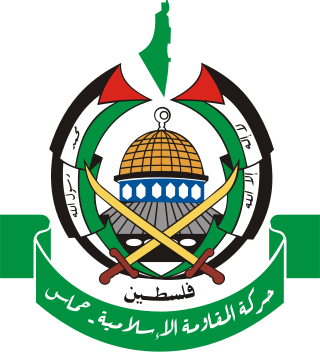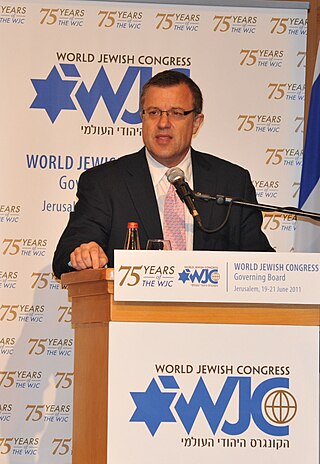Related Research Articles

Hamas, an acronym of its official name, Harakat al-Muqawama al-Islamiya, is a Palestinian Sunni Islamist political and military movement governing the Israeli-occupied Gaza Strip since 2007.

Arab–Israeli peace projects are projects to promote peace and understanding between the Arab League and Israel in different spheres. These are part of a broader attempt at a peace process between Palestinians and Israelis. Sponsors of such projects can be found both in Israel and Palestine.

The economy of the State of Palestine refers to the economic activity of the State of Palestine. Palestine receives substantial financial aid from international donors, including governments and international organizations. This aid is crucial for supporting the Palestinian Authority and funding public services and development projects. Palestinians working abroad send money back to their families in Palestine. These remittances provide a significant source of income for many households.
The Washington Institute for Near East Policy is a pro-Israel American think tank based in Washington, D.C., focused on the foreign policy of the United States in the Near East.

The economy of the Middle East is very diverse, with national economies ranging from hydrocarbon-exporting rentiers to centralized socialist economies and free-market economies. The region is best known for oil production and export, which significantly impacts the entire region through the wealth it generates and through labor utilization. In recent years, many of the countries in the region have undertaken efforts to diversify their economies.

Jeff Halper is an Israeli-American anthropologist, author, lecturer, and political activist who has lived in Israel since 1973. He is the Director of the Israeli Committee Against House Demolitions (ICAHD) and a co-founder of The One Democratic State Campaign (ODSC). He is a Jewish Israeli.

Anthony H. Cordesman was an American national security analyst. He held the Arleigh A. Burke Chair in Strategy at the Center for Strategic and International Studies (CSIS) and was a national security analyst on a number of global conflicts.
Stephen Zunes is an American international relations scholar specializing in the Middle Eastern politics, U.S. foreign policy, and strategic nonviolent action. He is known internationally as a leading critic of United States policy in the Middle East, particularly under the George W. Bush administration, and an analyst of nonviolent civil insurrections against autocratic regimes.

Robert Malley is an American lawyer, political scientist and specialist in conflict resolution, who was the lead negotiator on the 2015 Iran nuclear deal known as the Joint Comprehensive Plan of Action (JCPOA).

Richard Anderson Falk is an American professor emeritus of international law at Princeton University, and Euro-Mediterranean Human Rights Monitor's Chairman of the Board of Trustees. In 2004, he was listed as the author or coauthor of 20 books and the editor or coeditor of another 20 volumes. Falk has published extensively with multiple books written about international law and the United Nations.
The article describes the state of race relations and racism in the Middle East. Racism is widely condemned throughout the world, with 174 states parties to the International Convention on the Elimination of All Forms of Racial Discrimination by April 8, 2011. In different countries, the forms that racism takes may be different for historic, cultural, religious, economic or demographic reasons.
Just Journalism was a UK-based research organisation and pressure group, which commented on Israel and the Middle East. Its stated goals were to focus "on how Israel and Middle East issues are reported in the UK media." The organisation published online analyses in response to news stories, reported on "long-term trends", and opinion pieces for external publications.
The international non-governmental organization Human Rights Watch (HRW) has been the subject of extensive criticism from a number of observers. Critics of HRW include the national governments it has investigated, the media, and its former chairman Robert L. Bernstein.

Sarah Leah Whitson is an American lawyer and the executive director of Democracy for the Arab World Now (DAWN). She previously served as director of the Middle East and North Africa division of Human Rights Watch.

Daniel Diker is the president of the Jerusalem Center for Public Affairs, a public diplomacy and research institute in Jerusalem, Israel.
NGO Monitor is a right-wing non-governmental organization based in Jerusalem that reports on international NGO activity from a pro-Israel perspective.
Middle Eastern Americans are Americans of Middle Eastern background. Although once considered Asian Americans, the modern definition of "Asian American" now excludes people with West Asian backgrounds.
B'Tselem is a Jerusalem-based non-profit organization whose stated goals are to document human rights violations in the Israeli-occupied Palestinian territories, combat any denial of the existence of such violations, and help to create a human rights culture in Israel. It is currently headed by Yuli Novak, who took over in June 2023 from Hagai El-Ad, who had served as its director-general since May 2014. B'Tselem also maintains a presence in Washington, D.C., where it is known as B'Tselem USA. The organization has provoked sharp reactions within Israel, ranging from harsh criticism to strong praise.

Phyllis Bennis is an American Jewish writer, activist, and political commentator. Focusing mainly on issues related to the Middle East and the United Nations, she is a strong critic of Israel and the United States and a leading advocate of Palestinian rights.

Israel–Palestine relations refers to the political, security, economical and other relations between the State of Israel and the State of Palestine. Israel and the PLO began to engage in the late 1980s and early 1990s in what became the Israeli–Palestinian peace process, culminated with the Oslo Accords in 1993. Shortly after, the Palestinian National Authority was established and during the next 6 years formed a network of economic and security connections with Israel, being referred to as a fully autonomous region with self-administration. In the year 2000, the relations severely deteriorated with the eruption of the Al-Aqsa Intifada – a rapid escalation of the Israeli–Palestinian conflict. The events calmed down in 2005, with reconciliation and cease fire. The situation became more complicated with the split of the Palestinian Authority in 2007, the violent split of Fatah and Hamas factions, and Hamas' takeover of the Gaza Strip. The Hamas takeover resulted in a complete rift between Israel and the Palestinian faction in the Gaza Strip, cancelling all relations except limited humanitarian supply.
References
- ↑ "Truthout Annual Report 2016" (PDF).
- ↑ "Is War with Iran Next?" by Mark Weisbrot and Robert Naiman , Huffington Post , 22 February 2007
- ↑ "Welcome to Palestine: 'Even prisoners are allowed visits'" by Robert Naiman, Al Jazeera , 14 April 2012
- ↑ "Israeli Army: We have been instructed to Hit Hamas Hard" by Robert Naiman, Informed Comment , 11 July 2014
- ↑ Robert Naiman Discusses Netanyahu's AIPAC Speech, RT television, March 2015
- ↑ "The Iran Deal's Latest Hurdle: Big Donors" by Robert Naiman, Talking Points Memo , 2 September 2015
- ↑ "From the Tel Rumeida CPTnet Archives: March-April 1996 Updates", CPT website
- ↑ "Robert Naiman Uses Saudi Arabian Human Rights Violations as Pretense to Impugn Israel", CAMERA website, 20 May 2015
- ↑ "Can the US Congress bring justice for the Palestinians? : A response to Robert Naiman" by Joel Beinin, 29 September 2014